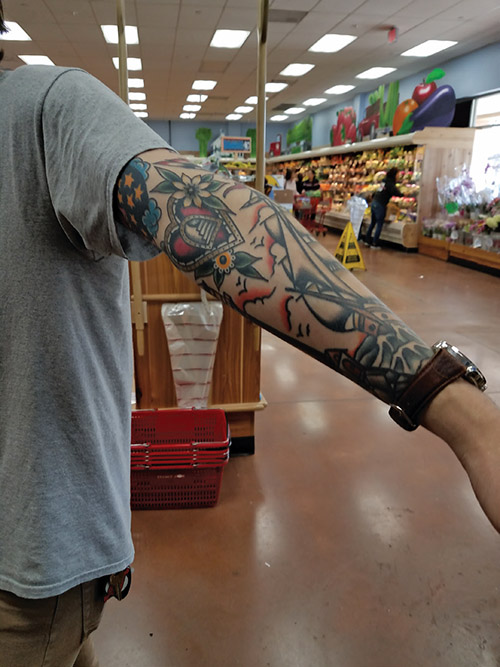
We all do it. None of us wants to be judgmental, but at times we are. Recently, upon visiting a family member in the hospital, we noticed another patient whose arms were resplendent with tattoos. It was difficult to see his skin. Upon mentioning to the person we visited that his “roommate” had artfully created designs on his arms, his response was, “I know, and he even seems intelligent.” At that point, Nina greatly regretted that she had even made note of the artwork.
Returning from Los Angeles last week (thanks to those who mentioned that they missed this column last week), Nina sat wondrously as she noted passenger after passenger boarding the plane with various types of tattoos. It was almost as if those who did not have any were in the minority.
We could ask ourselves, what is going on in the world? It is likely that many people that we know have tattooed their bodies. Fortunately for them, if they did not do it on visible parts of their bodies no one will know. Aside from the halacha that states that this is not allowed, what is it that “creeps us out” over the sight of bodies covered by tattoos? There was a time when we were brought up to stay away from people who decorated their bodies in this way. It was assumed that they were of a different class. Similarly, we still cannot understand why anyone has piercings throughout their body. One day many years ago, shortly after a Breslover yeshiva opened in Cote St. Luc, which is where we lived, my daughter took her children to the park near our home. As she and Mordechai sat watching the children play, they noticed a group of young women whose husbands were learning in Breslov. They were wearing long flowing skirts, but as they bent over to play with their children in the sandbox, suddenly one could see tattoos up and down their legs. Obviously they were baalei teshuva who now felt fortunate to wear long skirts. We remember when a young lady, about to be married and anxious to go to the mikvah, came with the question as to whether or not she would have to remove the piercing in her belly button. Her rav (Mordechai) explained that it would be necessary. She had no qualms about doing so, as the mitzvah of mikvah appealed to her. (She also knew that her rabbi would not marry her if she did not immerse herself.) Again, our philosophy has always been that even if a person does a specific mitzvah only once in their lifetime, it is important for them to do so. One never knows the impact such a little thing could have on the rest of their life.
We are sure we have mentioned in the past the admiration we have for the young adults who work at the day program that our daughter Naama attends. Each worker, with a rare exception, has either piercings, tattoos or both. We know of many people whose bodies are clean of “extras” who would not work or walk close to a person with a significant disability. Primarily from our experience with these young people, we have learned never to judge a person by his externals.
However, that is not always so easy for us. We are still shocked and often repulsed by what others have chosen to do to themselves. As we get older we realize that we need to be more and more accepting in order to pass these traits on to our children and grandchildren. None of us are too old to change our ways. It might require constant effort, but we need to set the example for others that acceptance should not be based upon someone’s similarities to ourselves. Rather we should keep in mind that just as we do not want others to judge us, we should open our hearts and minds to them as well.
By Rabbi Mordechai and Nina Glick
Rabbi Mordechai and Nina Glick are living in Bergenfield after many years of service to the Montreal Jewish community. Rabbi Glick was the rav of Congregation Ahavat Yisroel as well as a practicing clinical psychologist in private practice. He also taught at Champlain Regional College. The Glicks were frequent speakers at the OU marriage retreats. Nina coordinated all Yachad activities in Montreal and was a co/founder of Maison Shalom, a group home for young adults with special needs. They can be reached at [email protected].










